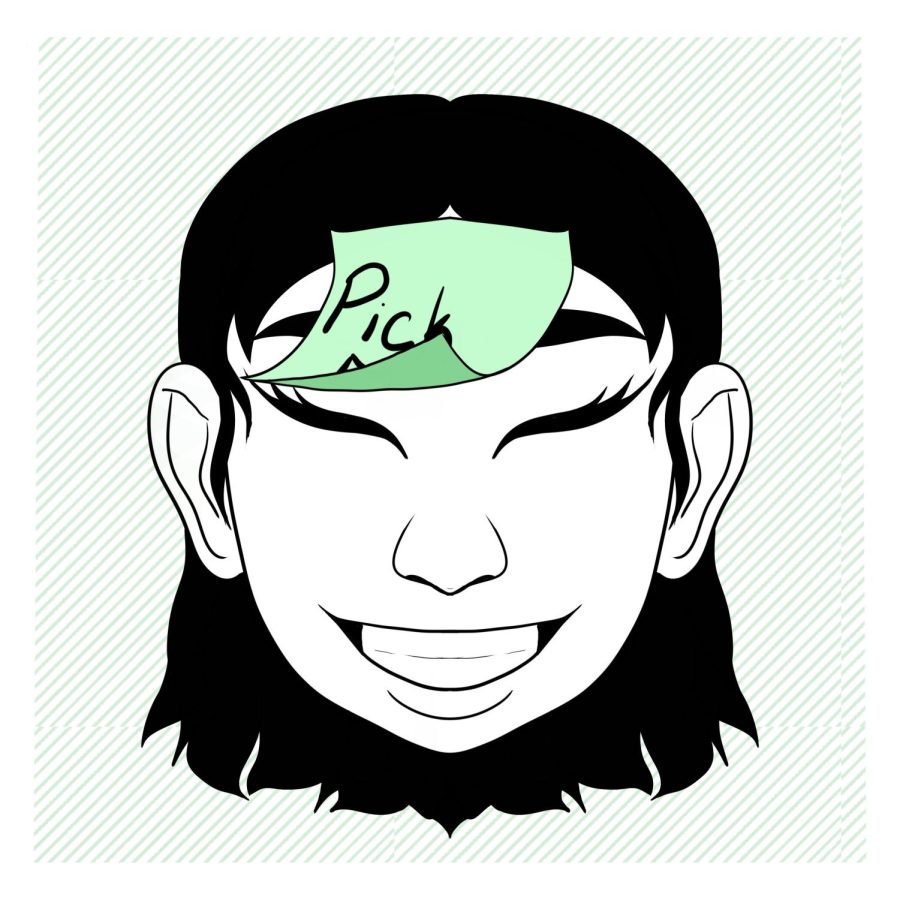Opinion | Diary of a reformed ‘pick-me’ — they don’t truly exist
April 3, 2023
“I’m not like other girls.” “Girls are too much drama.” “I’m just one of the guys.”
Chances are, you’ve heard someone say one or more of these things. Maybe you’ve said them yourself. I know I have. These are all statements stereotypical of the “pick-me girl,” a relatively new term for a phenomenon which has existed for ages — girls who reject femininity and the friendship of other girls in order to make themselves seem better in comparison.
The term emerged on TikTok, as people shared scenes from movies and TV with characters they found especially pick-me — like the scene from “Grey’s Anatomy” in which Meredith Grey delivers a speech to Derek Shepherd asking him to pick her, choose her, love her. Parodies of pick-me girls in class and hanging out with their friends fill the hashtag “pickmegirl,” and videos of girls vying for male attention by making fun of their friends or rejecting traditionally feminine activities receive comments like “Did he pick you yet?”
It was funny, at first, because a lot of the videos are pretty accurate. They depict, almost verbatim, actual conversations I’ve had with people I know. But once I thought more about it, I realized that it’s just a way in which women are encouraged to tear one another down, or do the very same thing they’re claiming to reject.
The whole idea of being a “pick-me” is ridiculous, simply because it’s impossible to truly be — or not be — a pick-me. It’s something I call the “pick-me paradox.” You see, the whole concept of pick-me girls is that they’re “not like other girls.” But, if we dive just a little deeper, by grouping a bunch of girls together — even if they claim they’re different — we’ll find that they’re actually pretty similar, which negates the whole premise of being a pick-me in the first place. And by labeling other girls “pick-me,” we’re asserting that we’re not like them, thus turning ourselves into pick-me girls.
In short, the creation of a term for a group of girls allegedly “different” from the rest means that we’re all pointing fingers at each other for essentially the same thing. It’s a double-bind, and there’s no winning this game — except to refuse to play at all. No matter what we do, when we judge other women, we’re going to feel like pick-me girls. For that reason, we’re all pick-me girls, and none of us are.
Okay, I know that was a lot. But it’s true! The process of pick-meification — yes, I made that up, too — harms everyone involved. And it stems from quite a few things — internalized misogyny, the male gaze, self-esteem issues, feelings of insecurity — you name it! If it’s negative and has to do with the way women treat each other or themselves, chances are that it’s part of it! Not to mention, everyone likes to feel special sometimes, and being a pick-me can provide one with that feeling.
Through the process of pick-meification, we are appeasing men and their desires for what they think women should be — even enforcing them on other people — because we’re convinced that it will make them love us more. But, instead of dismantling these patriarchal systems or whatever we should be doing, we’re…actively contributing to them. Doesn’t it seem ridiculous now?
The only people that “pick-me” culture benefits are men. I mean, when we pit ourselves against each other, it makes it that much easier for men to do it, too. And what’s it all for? Male validation? Take it from me — it’s so not worth it.
But let me get off my soapbox for a second. I’ll admit that I’m thankful TikTok wasn’t around when I was younger, because I was quite the pick-me myself. Watching these videos, my adolescence came back to me in flashes. I did things like telling jokes to boys I liked in middle school, jokes in which my friends were the punchline, because I wanted them to think I was funnier than the girls they had crushes on. I also recall making fun of girls who were good at doing their hair and makeup — something I’ve never been great at — and to this day, I believe it’s some kind of karmic punishment that I still can’t figure out how to French braid.
I was talking to a friend of mine recently, and we both realized we hated pink when we were younger — or, at least, we said we did — even though we love it now. I think part of that is how the femininity of pink was forced on us as little girls, and I guess it still kind of is. My choice in favorite color was a much bigger deal then, as if the color I chose for my lunchbox was a reflection of my character or who I’d be for the rest of my life. I didn’t even necessarily not like pink, but hating it became a part of my identity, all because other people told me that was what I was supposed to like.
As a child, the movies I loved were stories in which the antagonist was a popular girl, who wears a lot of pink and spends her time trying her best to remain thin, instead of playing sports or being effortlessly beautiful — think “A Cinderella Story.” Really, anything made in the early 2000s with a “mean girl” type character is sure to have some level of pick-meness.
And like in every clichéd teen movie I idolized, I felt like I was that girl in the back of the classroom, on the bleachers, in the diner — waiting for the men around to notice me. But, like Hilary Duff’s Sam tells Chad Michael Murray’s Austin at the end of the film — in a show-stopping barge-into-the-boys’-locker-room scene — waiting for a man to notice you is “like waiting for rain in this drought — useless and disappointing.”
And I don’t mean to critique these movies by any means, they’re what I was raised on. I mean, it’s not like there’s anyone out there who hasn’t been at least the tiniest pick-me — who hasn’t sung her heart out to pick-me anthems like “Before He Cheats” by Carrie Underwood, “Girlfriend” by Avril Lavigne or “You Belong With Me” by Taylor Swift?
These are all successful and popular go-to karaoke songs, and there’s a reason for that. They’re fun and nostalgic, and they’re sung by talented women — even if they’re also ripe with pick-meness. And maybe that’s okay. Realizing this doesn’t mean that these movies and songs can’t be our favorites now. I mean, I still love them, I just view them from a different lens.
And I’m not saying my fight is over — I still struggle with jealousy and self-esteem issues sometimes. But refocusing my attention on the actual problem rather than taking out my frustration on people I genuinely care about has made me feel infinitely better. Even today, I sometimes find myself mentally competing with other girls my age — even with my friends. But, I’m able to remember what it stems from and reframe the way I think.
As I’ve grown up, I’ve realized that women are not my enemy. I’m grateful for all the loving and supportive relationships I have with the women in my life. My friends are talented, smart, beautiful, funny. They’re cool, quite frankly — very cool.
And though it took me an embarrassingly long time to realize it, I did eventually come to terms with the fact that just because they’re amazing and wonderful doesn’t mean I’m not as well, and it certainly doesn’t mean that we need to compete. I am so much happier being a “girl’s girl” than I ever was being a “pick-me.” I’m exactly like other girls, and I’m so thankful for that.
Juliana Morello writes about whatever’s on her mind. Follow her on Instagram @juliana.morello or write to her at [email protected]








